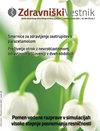The impact of endometriosis on in vitro fertilization outcome
Q4 Medicine
引用次数: 1
Abstract
Introduction: Nowadays, endometriosis represents the most frequent cause of female infertility.The treatment of choice is by all means laparoscopic surgery, which results in more than a 60 % pregnancy rate, regardless of the stage of the disease. For the rest of patients in vitro fertilization (IVF) is the most appropriate treatment of choice. Views of the impact of endometriosis on IVF outcome remain controversial and subject to debate. Whereas some studies have documented that endometriosis is associated with reduced pregnancy rates, others failed to prove this association. The present study was designed to elucidate whether or not endometriosis affects IVF outcome at our institution. The study was retrospective, statistical significance was considered at p ≤ 0.05. Methods: In 96 patients (group A) that underwent IVF program the only cause of infertility was endometriosis which had been previously treated surgically. Sixty-two (64.6 %) patients had minimal or mild endometriosis (group C) and 34 (35.4 %) had moderate or severe stage of the disease (group D). The control group (group B) consisted of 305 patients who underwent IVF procedure for tubal or idiopathic infertility. Among other variables, pregnancy rate per cycle and per embryo transfer (ET), take-home-baby rate (THBR) per cycle and per ET were compared between the study and control groups of patients as well as between both groups with endometriosis. The study was retrospective. Statistical significance was defined as p ≤ 0.05. Results: No statistically significant differences were found in any of the compared parameters. In Group “A” pregnancy rate per cycle and per ET was 41.7 % and 46.8 % respectively, compared to Group “B” where it was 36.4 % and 40.5 % respectively. THBR per cycle and per ET in Group “A” was 35.4 % and 43.0 %, whereas in the control group it was 30.5 % and 33.9 % respectively. Pregnancy rate per cycle and per ET in Group “C” was 40.3 % and 48.1 % whereas in Group “D” it was 44.1 % and 55.6 % respectively. THBR per cycle and per ET in Group “C” was 33.9 % and 40.4 % whereas in Group “D” it was 38.2 % and 48.1 % respectively. Conclusions: Endometriosis does not affect the outcome of IVF procedures. We believe that appropriate surgical technique is of paramount importance in patients with endometriosis, leading to favourable IVF outcomes.子宫内膜异位症对体外受精结果的影响
简介:如今,子宫内膜异位症是女性不孕的最常见原因。治疗的选择是通过腹腔镜手术,结果超过60%的怀孕率,无论疾病的阶段。对于其余患者,体外受精(IVF)是最合适的治疗选择。子宫内膜异位症对体外受精结果的影响仍然存在争议。虽然一些研究证明子宫内膜异位症与妊娠率降低有关,但其他研究未能证明这种联系。本研究旨在阐明子宫内膜异位症是否会影响我们机构的体外受精结果。本研究为回顾性研究,p≤0.05认为有统计学意义。方法:96例(A组)经体外受精治疗的不孕不育的唯一原因是子宫内膜异位症。62例(64.6%)患者有轻微或轻度子宫内膜异位症(C组),34例(35.4%)患者有中度或重度子宫内膜异位症(D组)。对照组(B组)包括305例因输卵管性或特发性不孕症接受体外受精手术的患者。在其他变量中,研究人员比较了研究组和对照组之间以及子宫内膜异位症患者两组之间的每个周期和每个胚胎移植(ET)的妊娠率,每个周期和每个ET的带回家婴儿率(THBR)。该研究是回顾性的。统计学意义定义为p≤0.05。结果:各参数比较无统计学差异。A组每个周期和每个ET的妊娠率分别为41.7%和46.8%,而B组的妊娠率分别为36.4%和40.5%。A组每周期THBR和每ET分别为35.4%和43.0%,对照组分别为30.5%和33.9%。C组每周期妊娠率和每ET妊娠率分别为40.3%和48.1%,D组分别为44.1%和55.6%。C组每周期THBR和每ET分别为33.9%和40.4%,D组分别为38.2%和48.1%。结论:子宫内膜异位症不影响体外受精手术的结果。我们相信适当的手术技术对子宫内膜异位症患者至关重要,从而获得良好的体外受精结果。
本文章由计算机程序翻译,如有差异,请以英文原文为准。
求助全文
约1分钟内获得全文
求助全文

 求助内容:
求助内容: 应助结果提醒方式:
应助结果提醒方式:


